Caroline Leavitt's Blog, page 99
January 12, 2013
Hester Kaplan talks about The Tell, how we know the ones we love, social media and so much more
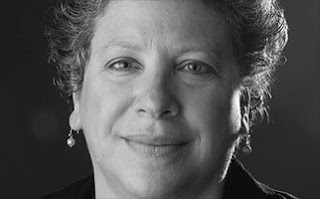
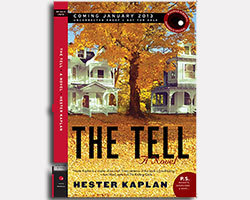
The Tell by Hester Kaplan, about marriage, loyalty, secrets, and how we really know the ones we love, is one knockout novel. Hester is also the author of i THE EDGE OF MARRIAGE (1999) which won the Flannery O’Connor Award for Short Fiction, and KINSHIP THEORY (2001), a novel. Her stories and non-fiction have appeared in numerous literary journals and anthologies, including The Best American Short Stories series (1998, 1999), Ploughshares, Agni Review, Southwest Review, Story, and Glimmer Train. Recent awards include the Salamander Fiction Prize, the McGinness-Ritchie Award for Non-Fiction, and a fellowship from the National Endowment for the Arts.She is on the faculty of Lesley University’s MFA Program in Creative Writing. I'm thrilled to have her here. Thank you, Hester.
All the characters in your novel are just achingly alive, and all have secrets, but Owen suffers the most. What was it like writing a character like that? I feel a great affinity for Owen and his inner turmoil. He’s a guy I’d like to know even better. I think a writer must be intrigued by her own characters; there must be something still unknown about them. What Owen wants out of life is elusive, even to him, and I could only help him so much, and then it was up to him. When I wanted him to talk, he wouldn’t. When we’re down or troubled or confused, we’re told that “talking about it” will help. I’m still amazed by how true this is, but also by how hard it can be to articulate and air your anguish. This is particularly hard for Owen because he fundamentally doesn’t trust that he can be fully loved and forgiven for what he calls his “cowardice.” Without that trust, secrets take on an enormous---and often debilitating—weight. As I was writing the novel, I began to feel how Owen’s reluctance to reveal himself warped his perception of other people. He was both suspicious and fearful of their secrets. What was it like spending so much time with Owen? There were times when I was writing the book when I wanted to grab him and yell, “Wake up! Can’t you see what’s happening? Talk!” Other times I wanted to sit quietly with him, tell him I knew how he felt, and begin to reveal some of my own secrets to him. He’s that alive to me. (I also think he’s very good-looking.)A lot of The Tell is about how well we know the ones we love. Do you think we ever can really know another person? I think we only imagine we can know another person, and it’s that imagining that exposes our own hopes and desires and fears. The imagining sparks our attraction to another person. We think we know what someone else would do in a given situation, how they’d feel, what they’d say. Sometimes we’re right, but more often, we’re wrong, and for me, that’s when things get interesting. The trick is to not miss how and when someone “acts out of character,” because those are the moments when our understanding of them deepens, and we begin to see how much there is that we don’t know. We stop seeing what is too familiar. For the fiction writer, the character that “acts out of character” is a potential bomb. Set him up in the scene and watch what he does. As Philip Roth’s character in The Human Stain says about a man he’s always thought he knew: “A tiny symbol, if one were needed of all the circumstances of the other fellow’s life, of that blizzard of details that constitute a human biography—a tiny symbol to remind me why out understanding of people must always be at best slightly wrong.” I have this quote hanging above my desk.In real life, we construct our understanding of our loved ones based on necessarily incomplete information—think about all those events and experiences and thoughts you’re never let in on. Fiction allows the writer to explore the space between what characters know each about other.. What resides in this space is what we’re always after in fiction and life, and we can’t be afraid to muck around in it. I love the sentiment in the novel that "people are safe when they are loved." Can you comment on that?To feel unloved is to feel the danger of being unseen. I’ve had the experience of going somewhere—running an innocuous errand, for example—and realizing that no one knew where I was at that moment or where I was going or what I had in mind. It struck me that this is what feeling unloved is like—no one is watching, no one is expecting you, no one will notice when you don’t show up. You might as well fill up the gas tank and drive forever.When we are loved, and when we love back, we watch closely and we’re watched in return. When we are loved, we have a safe place from which to grow and explore, because we know we have somewhere and someone to return to. To be unloved is to have fallen over the edge of a cliff; you’ve disappeared. Mira believes she is safe because Owen loves her and will always be home waiting for her—even as she goes to the casino and makes a mess of things. She calls Owen from the casino to assure herself that the “real world” still exists and will be there for her when she’s ready to it. For her, love is a safety net.. For Owen, love is a safety net he doesn’t entirely trust.The novel is so ingeniously plotted and it builds to such a crescendo, that I want to ask you how you figured out the structure. Were there any surprises along the way for you? For me, writing a novel is like being on one of those playground merry-go-rounds; I can jump off and get back on at any point, and then continue to go round and round. I also get a little dizzy because there’s such circularity involved in writing a novel. By the time I’ve gotten to the end of a draft, I know much more about my characters and where they’re going than when I started. Jumping back to the beginning—or any place, in fact—is about circling, about planting those clues for what happens later, about beefing up the details and images that will have centrifugal force by the end. Plotting this course out doesn’t come easily to me, which is why I’m always drawn to the short story form. In creating the world of my characters in this novel, I was often (happily) surprised by how a seemingly small decision by one character –Owen’s decision to pay Mira a surprise visit at work, for example--can give a new twist and turn to the plot. While writing, I think it’s critical be open to the surprising places your plot and characters can lead you—and then go there. This may lead you in a direction you hadn’t intended, but it may lead you where you need to go. What's obsessing you now and why? I wish I were one of those writers who can jump into a new project as soon as they’ve finished the old one. I need time to sweep out the corners of my head before I start refurnishing the place. This doesn’t mean I’m not obsessing—and that’s the right word--about an idea I’ve had for a while: writing about the place where I grew up. Over the past few months, I’ve been moving my parents from the house they’ve lived in my entire life. Chucking junk, boxing books, going through photographs, watching rooms empty out—I’m listening to all the stories these things are telling me. I’m keeping my eyes open for the details I’ve forgotten, and watching how they open up new rooms for me to wander in. In this piece of nonfiction, I’m thinking about the connection between the physical and aesthetic environment and the development of character. What question didn't I ask that I should have?Changing the subject from writing a book to selling a book, what’s struck me as I began the publication process of The Tell is how dramatically the whole business of book promotion has changed since my last novel. There were no blogs back then, no author websites or Facebook pages, and writers relied on print advertising and reviews to announce and promote their books. So here’s a question for you: do you think the ways we’re able to talk about writing online and on social media, and how in turn we’re able to we hear from readers, will begin to shape what we write next?
Published on January 12, 2013 09:52
Christine Onorati of Word Bookstore talks about opening a new store, bookselling, and so much more

Word is one of the coolest indie bookstores around. In Greenpoint, Brooklyn, it's warm, knowledgeable, cozy, and you feel like royalty when you read there (much appreciated by authors!) I was doubly excited when I heard they were doing so well, they are opening a new store in Jersey City, though I have now made it my mission to convince them to open one in Hoboken. (Hint: I'll work for free every day for a few hours, if you do. I swear.) I want to bow down and thank the amazing Christine Onorati for this interview. And everyone, go visit this fabulous store: 126 Franklin StreetBrooklyn, NY 11222718-383-0096 • info@wordbrooklyn.com
It's thrilling that you are opening a new bookstore in Jersey City. Tell us about it.
I am excited about the prospect of opening a new store in Jersey City (even though it's still not a done deal and I'm hesitant to announce it publicly just yet), mostly because I think the neighborhood is really hungry for something like WORD and I'm excited to help define the area with a business like mine. But to be honest, in this day and age I'm not convinced that every neighborhood can sustain a bricks and mortar bookstore. I had a small shop in the suburbs on Long Island before moving to Greenpoint and it was a struggle every single day there. People didn't support small, local business and it was hard to get them to to buy their books where price wasn't the bottom line. So while I'm optimistic about bookselling and hope that there's room for more small, niche stores to open up in areas where there are none, I'm also aware of how much bookselling is changing and I know that the location and the flexibility of the store is paramount. It's not enough to just put books on a shelf anymore and hope that someone buys them. A bookstore has to be so much more than that, it has to be a community hub, a safe haven for readers, a friendly convenient place to buy gifts, a source of knowledge and new ideas, etc etc etc. It's important to be ready to adapt to this changing environment and go with the flow. So what can a neighborhood do to attract a bookstore? I'm not sure. I know that Fort Greene in Brooklyn pinpointed their desire for a bookstore and the ladies who were opening Greenlight were able to partner with them and fill their need. So I guess a community can organize themselves like Fort Greene and prioritize what they want to see open up in their community, and then hope someone steps up to the plate.
Your store is such a warm, supportive community place. How does a bookstore do such magic?
One of the Community building is one of the most crucial aspects of bookselling today, as I see it. It's important to foster a community of readers, a place where people feel comfortable reading whatever they want and meeting other people with similar interests. It takes time, but I think after 5 years we've developed a really strong community base, through our partnerships with local organizations, our strong social media presence, and programs like the literary matchmaking board and store basketball league. We strongly support our fellow local businesses and organizations like the Greenpoint Soup Kitchen. This pride of our neighborhood comes through to our customers and they feel loyal to us all in turn. I always say it's amazing to me that a customer feels compelled to tweet about shopping in my store, and loves telling the world what they bought and how the experience was. This kind of connection between readers and locals is priceless, it's what makes me feel lucky every day that I have a business where I do.
I personally feel that the a town without a bookstore just doesn't have a soul. Would you agree?
One of my brilliant staff members wrote that quote in the FAQ, but I think it does sum up our philosophy of why we love doing what we do. If we all felt indifferent about books we wouldn't choose bookselling as a career. It's a tough job and definitely not the most lucrative. But the joy of finding others that share that love of books is just contagious, and there's nothing like spending a day talking about books to other people who love and appreciate them. And we do genuinely adore our customers. They are smart and unique and supportive and on most days, we couldn't all ask for a better job.
What three books are you pressing into everyone's hands these days?
I'm not on the floor so much these days, but I can tell you that some staff favorites that we all infinitely adore are Cloud Atlas by David Mitchell, The Gone-Away World by Nick Harkaway, Every Day by David Levithan, Forever by Pete Hamill, and I Want My Hat Back by Jon Klassen. Just a few of our faves, but I can list many more if you'd like. :-)
What's obsessing you now?
I think that the changing state of bookselling, as I mentioned above, is what I worry about the most. People expect books to be cheap or even free, despite the prices printed right on them. I think that we're lucky to be in a location where people understand small business and know that price is not the bottom line on why they shop where they do, but I'm also quite aware that this is not the norm in most of the country, where many people have to travel miles and miles just to find a physical bookstore. I worry that physical bookstores will continue to struggle and close if we can't keep up with the needs of the public. I dont' think that books are dying, as many predict, but I worry that bookstores, as we traditionally know them, are in danger of extinction if we don't adapt as fast as we can.
What question didn't I ask that I should have?
I can't think of anything you should have asked about.
Published on January 12, 2013 09:45
January 8, 2013
Tehila Lieberman talks about her prize-winning Venus in the Afternoon, admitting that her novella might be a novel, feeling shame about winning the Katherine Anne Porter Prize in short fiction, and so much more
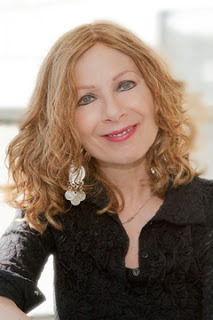
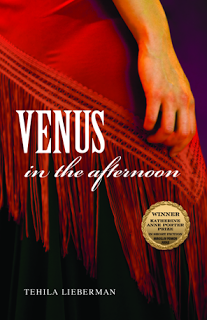
I love short stories. Tehila Lieberman's brilliant new collection, Venus in the Afternoon, won the Katherine Anne Porter Prize in Short Fiction, and her stories about grief, guilt, love, and sex, are haunting, harrowing and completely unforgettable. I'm so honored to host her here. Thank you so, so much, Tehila. Your prose is both elegant and enthralling, which brings me my favorite craft question. How do you write? For you which comes first, the language or the story, or are they one and the same?For me, they are one and the same in that they emerge simultaneously. The writing I most admire and enjoy is where I am propelled forward by the story but where the language is seamlessly contributing to the evocation of a place, person or state of mind. It is a fine line to walk and it's easy enough to slip to one side or the other, but I am a sucker for writers who pull off gorgeous language while keeping me riveted to what might be on the next page. When I recently read John Banville's The Sea and came to accept that not much was going to happen in present time but rather that all of the mystery lay in the past, I was totally swept up. I found myself, with great excitement, writing down word after word - gorgeous, evocative words that I had not yet, in all my years of reading, come across.Do you ever think of writing a novel? Or are you completely wedded to the short story?I have just completed a novel that I worked on for eleven years, alongside the short stories and various essays. It began as a short story but soon burst out of the frame. I had once abandoned a novel after years of work and so it took me a long time to admit that this might be one. I called it a novella for a while but it defied that categorization as well. It kept growing in both length and complexity. Some characters demanded more space, the various stories that were being interwoven developed some new twists and turns, and there you have it. It was enormously satisfying to complete it only months after completing the polishing of the collection and I have just begun to look for the right representation for it and for my upcoming projects.The characters in this collection are so vividly alive with such distinct voices. How do you go about creating a character?I try hard not to think - not always an easy task - but rather to come to some quiet and listen. If I can get myself out of the way, they will usually present a glimpse of themselves. Where my will comes in is perhaps in the choice of subjects in which I begin to wander - often subjects I want to learn about or explore. For example, the novel I've just completed contains a Blake scholar and therefore allowed me reexamine the Blake I was enamored of in my early twenties. It also involves Vietnam, a piece of our history that I wanted to understand in a deeper, more personal way. So the characters will emerge once I know something of the context. With one exception: a sassy female character who has been providing glimpses into her wry view of the world for years and whose context and story will need to be determined.Did winning the Katherine Anne Porter Prize in short fiction change you in any way--did it allow you to take more risks, for example or did the validation make you feel more confident?Actually - if you want to know the truth - the first thing I felt was shame. I now was going to have to see in print all of what the stories had not managed to achieve. Happily I moved past that and rigorously used every pre-galley second to polish polish polish and was able to tolerate the result. The validation is definitely wonderful. As for risk taking, when I've completed a piece, I routinely challenge myself to go somewhere completely different -- to venture into a subject, a voice or a world I haven't rendered before and so risk is often built into the way I work and each new piece is usually dramatically different from the one that preceded it. I don't find myself feeling very changed but am extremely grateful that my work will now reach more readers.What’s obsessing you now and why?The new characters emerging from the wings. An eccentric Southern aunt who semi-adopts one of the lost boys of Sudan, a woman whose family has put her away in a nursing home of sorts on the Israeli-Palestinian border. Also a non-fiction project that is close to my heart that will involve conducting some interviews in this country and others.What question didn’t I ask that I should have?Occasionally I am asked about the seed or central question from which a particular story emerged. I can speak to that briefly regarding the title story, "Venus in the Afternoon". I spent about fifteen years helping to raise my then husband's son, from age three until adulthood. This introduced me first hand to all of the complexities of growing attached to someone else's child. I also have a rich and complex relationship with a now grown goddaughter. There aren't any particularly apt words to capture these semi- but non-parental relationships, which are obviously very particular and individual. So I was very attuned to the interesting, historically maligned relationship of step-parenting. I wanted to explore it in a fresh way that had nothing in common with my experience except the growing tenderness and deep love that can spring up and take everyone by surprise. And so I created Grant and put him on a crash course with the woman who had dumped him in Spain a decade before for a bullfighter on a motorcycle and then gave her a preternaturally mature and precocious child who "gets" Grant more than she does. That was great fun.
Published on January 08, 2013 19:02
Tahila Lieberman talks about her prize-winning Venus in the Afternoon, admitting that her novella might be a novel, feeling shame about winning the Katherine Anne Porter Prize in short fiction, and so much more


I love short stories. Tahila Lieberman's brilliant new collection, Venus in the Afternoon, won the Katherine Anne Porter Prize in Short Fiction, and her stories about grief, guilt, love, and sex, are haunting, harrowing and completely unforgettable. I'm so honored to host her here. Thank you so, so much, Tahila. Your prose is both elegant and enthralling, which brings me my favorite craft question. How do you write? For you which comes first, the language or the story, or are they one and the same?For me, they are one and the same in that they emerge simultaneously. The writing I most admire and enjoy is where I am propelled forward by the story but where the language is seamlessly contributing to the evocation of a place, person or state of mind. It is a fine line to walk and it's easy enough to slip to one side or the other, but I am a sucker for writers who pull off gorgeous language while keeping me riveted to what might be on the next page. When I recently read John Banville's The Sea and came to accept that not much was going to happen in present time but rather that all of the mystery lay in the past, I was totally swept up. I found myself, with great excitement, writing down word after word - gorgeous, evocative words that I had not yet, in all my years of reading, come across.Do you ever think of writing a novel? Or are you completely wedded to the short story?I have just completed a novel that I worked on for eleven years, alongside the short stories and various essays. It began as a short story but soon burst out of the frame. I had once abandoned a novel after years of work and so it took me a long time to admit that this might be one. I called it a novella for a while but it defied that categorization as well. It kept growing in both length and complexity. Some characters demanded more space, the various stories that were being interwoven developed some new twists and turns, and there you have it. It was enormously satisfying to complete it only months after completing the polishing of the collection and I have just begun to look for the right representation for it and for my upcoming projects.The characters in this collection are so vividly alive with such distinct voices. How do you go about creating a character?I try hard not to think - not always an easy task - but rather to come to some quiet and listen. If I can get myself out of the way, they will usually present a glimpse of themselves. Where my will comes in is perhaps in the choice of subjects in which I begin to wander - often subjects I want to learn about or explore. For example, the novel I've just completed contains a Blake scholar and therefore allowed me reexamine the Blake I was enamored of in my early twenties. It also involves Vietnam, a piece of our history that I wanted to understand in a deeper, more personal way. So the characters will emerge once I know something of the context. With one exception: a sassy female character who has been providing glimpses into her wry view of the world for years and whose context and story will need to be determined.Did winning the Katherine Anne Porter Prize in short fiction change you in any way--did it allow you to take more risks, for example or did the validation make you feel more confident?Actually - if you want to know the truth - the first thing I felt was shame. I now was going to have to see in print all of what the stories had not managed to achieve. Happily I moved past that and rigorously used every pre-galley second to polish polish polish and was able to tolerate the result. The validation is definitely wonderful. As for risk taking, when I've completed a piece, I routinely challenge myself to go somewhere completely different -- to venture into a subject, a voice or a world I haven't rendered before and so risk is often built into the way I work and each new piece is usually dramatically different from the one that preceded it. I don't find myself feeling very changed but am extremely grateful that my work will now reach more readers.What’s obsessing you now and why?The new characters emerging from the wings. An eccentric Southern aunt who semi-adopts one of the lost boys of Sudan, a woman whose family has put her away in a nursing home of sorts on the Israeli-Palestinian border. Also a non-fiction project that is close to my heart that will involve conducting some interviews in this country and others.What question didn’t I ask that I should have?Occasionally I am asked about the seed or central question from which a particular story emerged. I can speak to that briefly regarding the title story, "Venus in the Afternoon". I spent about fifteen years helping to raise my then husband's son, from age three until adulthood. This introduced me first hand to all of the complexities of growing attached to someone else's child. I also have a rich and complex relationship with a now grown goddaughter. There aren't any particularly apt words to capture these semi- but non-parental relationships, which are obviously very particular and individual. So I was very attuned to the interesting, historically maligned relationship of step-parenting. I wanted to explore it in a fresh way that had nothing in common with my experience except the growing tenderness and deep love that can spring up and take everyone by surprise. And so I created Grant and put him on a crash course with the woman who had dumped him in Spain a decade before for a bullfighter on a motorcycle and then gave her a preternaturally mature and precocious child who "gets" Grant more than she does. That was great fun.
Published on January 08, 2013 19:02
Leah Stewart talks about The History of Us, Cincinnati, the stories we depend on, and so much more
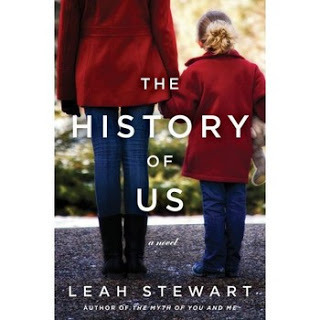
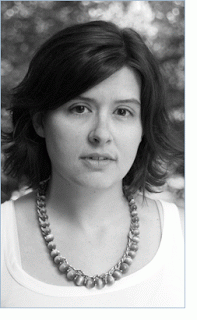
Leah Stewart has a quirky, interesting pedigree--and she's totally cool, too. She's worked as a secretary at Duke, a cataloguer in a used bookstore, a magazine editor, a copyeditor, and a staff member at the Sewanee Writers’ Conference. She has been a visiting professor at Vanderbilt University, Sewanee, and Murray State University. The recipient of a 2010 NEA Literature Fellowship, Leah teaches in the University of Cincinnati’s creative writing program, and lives in Cincinnati with her husband and two children. Her newest novel, The History of Us, is a knockout. Thanks so much for being here, Leah!
You’ve had three other extraordinary novels published and praised, Husband and Wife, The Myth of You and Me, and Body of a Girl. I’d like to know what sparked the writing of The History of Us? What were the new and distinct challenges you faced with this book?
Well, first, thanks so much! This book originated in a different way from my others--instead of having a voice and some idea of a situation, I had a setting (Cincinnati), a theme (location and identity), and a sense that in some way I wanted to model the book on George Eliot's Middlemarch. My first draft, like Middlemarch, had something like ten points of view. It was probably a little confusing.
Point of view was actually the biggest technical challenge for this book. In my other books, I used the first person, and stayed with only one character all the way through. History of Us is not only in third but shifts between three points of view. Writing in the third person was a joy after all that time confined to one mind per book, but figuring out how to organically transition between the different characters was challenging. There was also a lot of structural work because I follow different plot lines with each character, while still trying to advance an overall story about all of them. I read a lot of multiple pov novels--Allegra Goodman's The Cookbook Collector, Carol Anshaw's Carry the One, your Pictures of You trying to figure out how to do it.
Now I'm writing a book that switches between third and first, so I seem to want to keep complicating things for myself.
So much of the novel is about Cincinnati and the idea of how you become more--or less-of yourself, depending on where you live. How did you personally change living in Cincinnati and how did that fit into how you shaped your characters?
I think what's changed about me is that I've never felt settled anywhere before. I grew up military, kept moving around as an adult, and the possibility of picking up and leaving wherever I was has always been in my mind. But I have kids now, and a house, and I'm tenured at the University of Cincinnati, so for the first time I feel permanent. That feeling is a lot of what gave rise to this novel--thinking I might stay here made me very interested in other people's relationship to the place, so I began to pay a lot of attention to that. I had friends move away in part because they always felt they belonged somewhere else, like they couldn't be the most fully realized versions of themselves here, and some of that went into how my character Eloise feels about living here. And the longer I've been here, the more I like it, so my own affection for the city went into Theo.
I wanted to talk about the title, The History of Us, which implies that our lives are stories that we can choose to make sense of in a factual or revisionist way. Can you care to comment?
Yes, that's definitely part of what the title means. It's also literal in a couple of ways: Theo and Eloise are historians, and the book is about in part what to do with the family house, which represents and contains their family history. Living here, I feel very aware of the history of the city, too, because it's an old city and because so many of the old buildings are still in use (my own house is more than a hundred years old). I grew up mostly in the suburbs, so the presence and weight of history here is a profoundly different experience for me. }
How does teaching effect your writing? And what’s your daily writing life like?
It's a complicated relationship. Teaching stops me from writing pretty regularly. But it also feeds and strengthens the writing, because having to articulate my ideas to students is enormously useful for me, and I learn a great deal from working with them on their manuscripts. During the school year I try to set aside at least one day a week that's devoted to writing, and often I get two, and a little bit of extra time here and there. The nice thing about having a job, as opposed to when I was trying to write full-time, is that when I get to write it feels less like work than like a luxury.
What’s obsessing you now?
Doctor Who! Seriously. I've come to it late and am a couple seasons behind but I can't stop watching it. Also Sherlock. I'm in a BBC phase. My literary obsession is Margaret Atwood. She somehow manages to offer the best of both literary and plot-driven fiction, which is my ideal. I'm now trying to write a novel with her work as a model.
What question didn’t I ask that I should have?
Let's see. Good books I've read lately? One of my PhD students just published her first novel--Y by Marjorie Celona--and The Next Time You See Me by Holly Goddard Jones, which is out in February, is also terrific.
Published on January 08, 2013 18:53
Ladette Randolf talks about Haven's Wake, obsessions, Mennonites, farm families and so much more

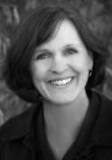
Ladette Randolph is the editor-in-chief of Ploughshares magazine and is Distinguished Publisher-in-Residence at Emerson College. She is the award-winning author of A Sandhills Ballad (Nebraska, 2011) and This Is Not the Tropics and is the editor of two anthologies, including A Different Plain: Contemporary Nebraska Fiction Writers, both available in Bison Books editions. She is the recipient of the Pushcart Prize, a Rona Jaffe Foundation grant, four Nebraska Book Awards, and the Virginia Faulkner Award. I'm so honored to have her here to talk about her stunning new novel. Thank you, Ladette!
What sparked the idea for this novel?
I had toyed with the idea of this novel for ten years before I began to write it. I didn't start with a character or an idea (like I have with my other work) but rather with a question about something I'd witnessed--a certain dynamic-- especially in rural farm families where adult children often stay on and work with the parents. What intrigued me in particular was the relationship between a loving but controlling mother and her adult children. Since my own mother has always been quite the opposite of controlling, it makes my interest all the more curious.
Why was this a novel you felt compelled to write?
The origins of this particular novel are mysterious to me. I really can't account for why I spent five years writing about the Grebel family and their particular problems, only that as I wrote I continued to be interested in them and kept discovering through the writing process new layers of complexity and conflicting perceptions that kept me interested.
What question were you hoping to answer?
Since I didn't begin the work for HAVEN'S WAKE with a clear sense of the characters and their situation and had only a vague feeling about what I wanted to explore, I think the question I was asking kept shifting over time. In the "zero draft" (what I call the very first draft) I was simply trying to answer the question of who I was writing about. Once I discovered my three point of view characters I still had a lot of work to do to understand their complicated history together. This story isn't based in my own family history, so the work of discovery demanded a lot from me.
I was enthralled by all the details about Mennonites and about Nebraska and I wanted to ask about the research you did, and how you know what you know?
I'm a fifth generation Nebraskan, so I know the Nebraska landscape very well. As for the Mennonite aspect of the novel, I have several extended family members who are conservative (as opposed to Old Order) Mennonites. I'd spent time in their homes, but I certainly didn't know the doctrines of the faith (except that they're one of the peace churches and have refused to bear arms for 500 years) before I started writing the novel. I did a lot of reading of Mennonite theology and read a little from the doorstop-sized chronicle of their history of religious oppression called THE MARTYR'S MIRROR. I'm certainly not an expert in Mennonite theology and practice, but I tried very hard to be respectful of the faith, which I admire very much. It matters to me that I've portrayed the faith accurately and fairly, even if some of my characters misinterpret it.
Were there any surprises?
All the time. My characters surprised me as did my research. As to the latter, while I knew that the Mennonite commitment to disaster relief was a important part of their expression of faith, I hadn't been aware that in some cases Mennonite elders would actually go into war zones. Their concern for unarmed citizens in those situations sometimes takes the form of standing between armed soldiers and those citizens. I didn't want the fact that the characters are Mennonite to be central to the novel (it's simply who they are), but I couldn't resist slipping that bit about the activist elders into the story.
I’d love to talk about craft. What is your daily writing life like?
I've been a publishing professional for a long time and before that finished and PhD and raised three children. I came to writing a little later than a lot of my peers, so my writing discipline was formed by my adult responsibilities. For many years I've tried to write an hour a day five days a week. I don't always get that accomplished and I sometimes take "vacations" from that obligation, especially if I'm between things or need to focus on other aspects of my life more.
What kind of writer are you? Do you outline or do you find yourself rambling in the story?
I never outline. I rarely know where I'm going when I start something. Sometimes I'll hear a phrase or see an image (this is more true for short stories) that will lead me to eventually discover a character. In my first novel, I saw the main character and the arc of her life but I didn't have much aside from that.
You’re also the editor of the very prestigious magazine Ploughshares and you are Publisher-in-Residence At Emerson. How do you juggle that with your own writing?
Like most writers today who are also juggling a day job and their writing life, I just do it. I'm incredibly fortunate to have the work I do with Ploughshares and teaching at Emerson College. I feel enormously privileged in my life to be working in and on behalf of the literary community. If the work sometimes takes away from the writing, it also contributes. As I've gotten older I've realized it's never been easy to be a writer, even if you have all sorts of time available.
What’s obsessing you now?
What's concerning (perhaps obsessing is too strong a word) me now in terms of my own writing is a memoir I've just finished (under contract with University of Iowa Press). I'm doing final revisions, so it's on my mind a lot these days. I also have a lot of unpublished short stories that I need to make some decisions about. At work, we've just put to bed the Spring 2013 issue of PLOUGHSHARES (guest-edited by Major Jackson) and I'm thinking about it and AWP, which will be in Boston this spring. In my personal reading time, I've been rereading Chekhov. And to stay with the Russian theme, I've been rereading ANNA KARENINA because my husband read it for the first time this year and kept raving about it. I hadn't read it since I was 21 and I could only remember the plot. What fun it's been to rediscover that novel after all these years. Also in my personal time I've been learning (slowly) to play the accordion. It isn't always pretty but it's sure a lot of fun.
Published on January 08, 2013 18:42
January 6, 2013
Melanie Benjamin talks about The Aviator's Wife, Anne Morrough Lindbergh, cults of celebrity, nonscientific researching and so much more
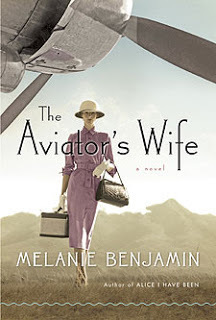
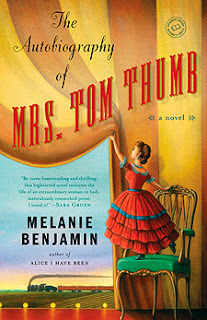
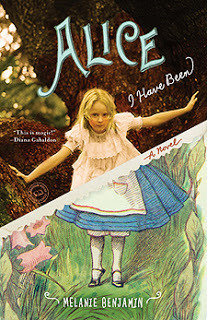
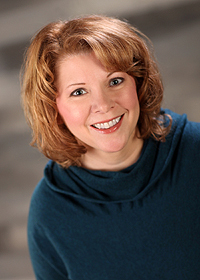
When I think of Melanie Benjamin, I remember a freezing cold Chicago night (the city was shut down!) when she and author Laura Ruby came out to not just hear me read, but to have drinks with me, and Melanie drove me home. I had already admired and loved her novels, and it was a treat to be able to get to know her in person--and come to love and admire her, too.
She's the author of extraordinary historical novels: Alice I Have Been, Mrs. Tom Thumb, and her latest, The Aviator's Wife, about Anne Morrow Lindbergh--and it's a stunner. I'm so thrilled and honored to have her, here. Thank you , thank you, Melanie.
You’ve focused on some of the most startling and original women in history, including Alice of Alice in Wonderland Fame, and Mrs. Tom Thumb. What drew you to Anne Morrow Lindbergh?
I'm always interested in finding women whom we think we know, but don't, really - or whose stories are lost to history. In Anne's case, it was the former. We know who Anne Lindbergh is - but not really. The name's familiar, some parts of her story are, but the entire scope of her life is really lost to most modern readers. And even her most lasting legacy - her writing, particularly GIFT FROM THE SEA - isn't as well known to readers today. And Anne is one of those elusive figures that attracts writers like me; she's always there, in the background of history, but it's hard to pin her down. She's a name, one that's both familiar and vague. That always attracts me as an author. I always thought she was a heartbreaking figure; I suppose that's what initially attracted me. But I was surprised to discover her hidden strength. And her hidden passion!
What surprised you in the researching of the book, and how do you do your research? Do you have help?
I do my research in a very unscientific way. I look at a life, I read enough about it to give me a good solid foundation. Then I pick and choose the details that will make a compelling novel - knowing that I will be leaving out, or not fully exploring, many of the stories that make up a remarkable life. I allow myself to ask the what ifs. I look at a life, even one that's as documented as Anne's, and I see the hidden corners, the locked closets; I wonder what she didn't tell us. I never take anything on face value; I'm always seeing things that others don't, even in the most mundane, every day objects. That's what drives me as a writer and a storyteller. I have learned that too much research can stifle my creativity, so it's always a balance for me; I need to learn the basic facts, get a sense of the time and place, but if I lose myself too much in the research I find I can't imagine the things I need to, in order to write a compelling novel with fascinating characters. My imagination is my greatest strength as a novelist - not my ability to research! For me, I don't spend too much time worrying about physical details; it's the emotional journey that fascinates me. The people, the relationships that speak to us today, across the years; that's what makes a great historical novel, in my opinion.
What I loved so much about the book was how you dealt with the cult of celebrity, and the cost of that celebrity. Can you talk about how that differs from what is going on today? And can you also talk about the stresses on a relationship when two people have both very public personas and private lives?
Oh, the celebrity issue! It was stunning to discover how completely pursued the Lindberghs were, in a way not really seen before. Thanks to newsreels, the rise of radio, the pulpy newspapers, they were known to the public in a brand new way; the first real modern celebrities. But unlike Vinnie Stratton, whose story I told in THE AUTOBIOGRAPHY OF MRS. TOM THUMB, the Lindberghs did not cultivate fame. They simply went about their lives - their fabulously courageous, glamorous lives - and were stunned by the public appetite for their every move. They didn't quite understand how glamorous a figure they cut, this young, beautiful couple living in the air, breaking records, accomplishing daring feats. It was simply what they did. And so that's the big difference between their celebrity, and what passes as celebrity today. They did not seek it, and so, perhaps, were even more pursued than if they had cultivated it. I liken the publicity surrounding them to that surrounding Princess Diana. Again, someone who did not seek publicity, whose life was ruined by the relentless pursuit of photographers and reporters. Someone who, through not fault of her own, was beautiful and young and living a fairytale life, or so the public wanted to believe.
As far as stress, well - the Lindberghs had to wear disguises when they went out in public! They couldn't sit together in the theater, for fear of starting a riot. How does a newlywed couple handle this? They took to the sky, whenever possible, always knowing that they had to come back to earth at some point, even more pursued. So I do think their early marriage, when they could escape in this way, was probably stronger than later, when they couldn't. At least in the sky, it was just the two of them. It was never that way on the ground.
I also saw on FB that you mentioned you were thinking of your “presentation” of the book as you toured. Can you talk about that?
My presentation - what I"m going to be talking about while on tour - has come to involve a PowerPoint presentation! I started this with ALICE I HAVE BEEN, using the real photographs that inspired me to write that book, and continued this with MRS. TOM THUMB. So once more, I will be showing photographs of the Lindberghs, maybe even a newsreel, as I talk about the book. But this time, I think I'm going to speak more of the difficulties I encountered writing this; it was the hardest book I've written so far, and primarily it was because I was very respectful - too respectful, probably - of their surviving children, and of Anne's written legacy. I had a hard time finding that authorial distance that's necessary for me to write my own novel, and treat these real people as characters of my own imagination. I didn't have that hard a time with my previous novels but I did with this one. I had to tear this book apart and put it back together many times, before I finally made it my own. I wrote the first draft as a roman a clef; it was clearly "based on" the Lindberghs but I changed names, locations, circumstances. My wise editor let me do this - and then she sweetly told me I had to rewrite it again with the real names. And I completely understood. I knew in my heart of hearts, while I was writing the first draft, that she would make me change it, but I needed to do it that way first, to kind of get it out of my system, to start the process of claiming Anne as my own character, someone whose story I could tell in a novel. As I said, it's a fine line; you just can't be too respectful as an author or you won't end up with a compelling novel, just a dry, boring recitation of facts. And I was far too respectful at first.
So I think I'll discuss this on tour!
What’s your writing day like?
My writing day changes all the time! I think it's more important to be ultra disciplined when you're first starting out, in order to train the writing muscles. And I do strive for some routine, at least in the beginning of a novel; I live with the research and the idea for quite a while before sitting down to write, but when I do I tend to write in the afternoon, no more than 2-3 hours at a time. In the morning, I try to take care of business stuff, and in the evening I'm often talking or Skyping with book clubs. But once the book is well on its way, I find I can write anywhere, anytime. I get some of my best writing done on planes! And then at the very end, I do try to hide away for a couple of weeks and just see it through to the very last sentence. Then, of course, comes the revising, which is the part of writing that I love! I hate the first draft (although I revise as I go, too). But to me, it's just a matter of getting words down, any kind of word; I don't think too deeply about it. I do when I go back to revise; that's when I'm my most creative and concerned with prose.
In an age when publishing can be cutthroat, you’re incredibly generous to and supportive of other writers (I still can’t forget one blisteringly cold winter evening when you helped me get into the locked up bed and breakfast where I was staying!) What’s your personal philosophy about the publishing world and how writers should treat other writers?
I remember that night, seeing you into your Bed and Breakfast! I was about to pack you into my car and take you home with me, if you couldn't get inside! I don't know if I have a personal philosophy, per se. I do make a real effort to see other authors when they're in my hometown on tour; for me, the book signing is the most frightening part of the job. Not speaking in public - I love that. But the fear of empty chairs. It's so hard to get people to come out these days. So I do try to come out to author book signings whenever I can, just so there's at least one friendly face! And I love social media for its ability to talk about my friends' books in such a public way. It's a great way to have a conversation, and I think it's such an easy thing to do when a friend has a book out. Publishing is very hard; I've certainly had an interesting career full of rebuilding and starting over again. I never forget that, and I do tend to take a very pragmatic view of it; I don't have any glamorous illusions. It's a business, one I'm privileged to be in, and I will continue to work hard and do everything I can to remain in it. And I respect every author who puts her work out there, and will do what I can to support and encourage. But you know, ultimately it's kind of a selfish business; there is only so much time in the day and we all have to spend the most time on our own books and writing. I understand that, and I hope other authors do, too. We're our own best advocates, ultimately.
What's obsessing you now and why?
Right now, I'm obsessed with traveling! This year marked the first time I ever traveled overseas, and I made trips to both Paris and London. This is a dream long delayed by family responsibilities, and perhaps my own fears. I just turned 50, and it's been very freeing; I'm no longer delaying dreams. So I've been traveling a lot, both with my husband and solo. And I just love it!
Published on January 06, 2013 14:32
January 5, 2013
Randy Susan Meyers talks about The Comfort of Lies, adoption, how much do you want to weight and why, and so much more
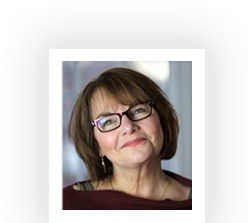
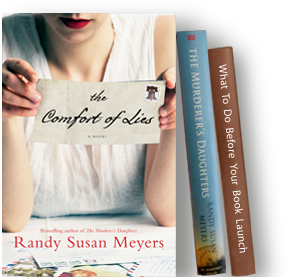
Randy Susan Meyers is the dazzling author of The Murderer's Daughter and The Comfort of Lies, her newest, about infidelity, marriage and motherhood. Thanks for being here, Randy!
Where did the idea for this novel spark? I always feel that writers write the books that they need to read themselves, that we write about the things that haunt us in some way. Would you agree? Can you talk about this, please?
Writing The Comfort of Lies drew me to dark places and gloomy themes (falling hard for a man who isn’t yours; learning your husband has cheated; an unplanned pregnancy; thinking that you’re not cut out for motherhood; giving up a child for adoption; wrestling with the pull towards work and the demands of motherhood; failing at work.) Blowing up emotional truths into a “what-if” novel forced me to visit past sins of my own, sins that were visited upon me, and sins that had always terrified me as my future possibilities.
I didn’t give up a baby for adoption nor adopt a child, but with every pregnancy scare I had, I wondered about the choices I might make. Infidelity? I struggled with the issue in ways that allowed The Comfort of Lies to come frighteningly alive in my mind (and hopefully on paper.) I haven’t suffered through all of my characters’ crisis’ but I’ve been close enough to imagine them all far too well.
People disappearing, or not being what or whom one thought—these themes are at the core of my writing and my life. The Comfort of Lies is not autobiographical—but I drew on bad times in my life and exploded those stretches into “could be far worse” and “what if.” I examined that thin line teetering between morality and forgiveness. The Comfort of Lies is about the fierce intersection of three very different women, all swirling around an adoption that happened five years prior, and it’s also about what it really means to be a mother. Can you talk about that, please?Motherhood. Isn’t is complicated and doesn’t it beg honest examination? I had my first daughter when I was twenty-one. I barely remember being an adult when I wasn’t a parent. I learned early that we are only as happy as our unhappiest child. The Comfort of Lies asks if having children defines us. One female character hates the routines of motherhood—does this prevent her from being a good mother? Does anyone enjoy all moments of motherhood? Another gave up her child and wonders if she thus lost any claim to considering herself a mother. A male character learns about his child when she’s five years old—can he conjure up instant love for her, and will his wife be able to withstand this split in his loyalty?All the characters wrestle with questions about adoption—but none more than the adoptive mother, who believes she has no right to complain, as though she’ll be judged harsher for owning up to the mind-numbing boredom that all parents experience. Plus, she finds it reprehensible in herself that she would rather be at work than with her child.All characters are forced to examine the rights of a five-year-old girl versus their own desires. There are often collisions between the wants and needs of children and the wont and desire of their parents. On whose side should the decision-making arrow fall? And, should parents hold secrets from their children? Is this ultimately for the comfort of the adult or the child—and what price do we pay for hiding truth from our sons and daughters?My favorite question is always about craft. What kind of writer are you? Do you plan things out? Do you outline or do you just follow your pen? What’s your daily writing life like?I plan and outline, but only after I’ve pondered and held an idea close. Sometimes my deliberation period is years long—but once I’ve entered the planning, outlining and writing-first-draft phase, I move quickly.My writing personality (I believe we all have creative dispositions) requires a fairly linear approach:· Dream phase: aka, my murky idea time. This often comes from an event or traumatic moment—either in my life or the news—which engenders “what if” or “how could one possibly endure xyz?” These ‘dreams’ are followed by or concomitant with characters climbing out of the soup of imagination.· Overall planning stage: I sit down and write a one or two page ‘essay’ of my book—what I call an overview. It is meant for my eyes only; it’s me telling myself what the book is about. · Research. I love this stage and it’s not limited to a cold discrete time period. I need to have my underpinning solid to move forward with authenticity and for my brain to work. I pair my nonfiction study, Internet digging, and people-interviews with reading as many memoirs around my topic as I can find. · Outlining: First I write a series of plot points—scenes and incidents that must happen to tell my story. Then these points (usually index cards) are put into the proper place on a timeline and then outlined in drafty chapters and scenes. · Characters: I name and write an overview of each character. (I can’t work without characters carrying a name that rings for me.)· Simplified, I think of it like this: Dream: A wolf who works through manipulation instead of force. Story: A wolf tries to trick a girl into becoming his dinner. Characters: Who is the damn wolf, who are his wolf-buddies, and who is his prey? Outlining: How we get from the wolf’s initial question of what he wants and how he’ll be thwarted to his ultimate failure or success. What steps do the wolf and Little Red Riding Hood take throughout the book? And then I write many drafts, letting them cool off between takes.My daily writing life is fairly structured. I am lucky enough to write full time. I get to work soon after my husband leaves for his job at 8 AM. I divide my day (but not well) between what I consider the business of writing, (everything from talking to my agent to interviews like this,) goofing off (Facebook, Twitter, reading articles about the end of the book as we know it and the death of publishing, mani-pedis, food-shopping) and writing fiction—whether it be first draft, revision, or final pages before the book will be printed. When my husband comes home, around 7, I try to close my computer, but I’m not always good at that. I often go back to the computer at night. I don’t set myself micro-deadlines (such as X words a day, something that works for many) but instead stick to making a macro calendar. I will mark exactly what month/day/week I expect to complete a draft and then operate as thought my life depends on getting that draft done. Overall, I’m a harsh boss to myself (making me wonder what the hell I was like when I was a director in a variety of human service agencies.)Do you think there ever is a moment when we should lie?Should? Yes. When someone asks you if they look fat or old, or if the haircut they just got looks okay, they’re rarely looking for unvarnished truth—they want reassurance. One’s relationship with the person should presage the answer to whether you should lie or be truthful. For instance, I expect my husband to tell the truth 85.5 % of the time—and he knows exactly where, what, and why.When I worked with batterers and abusive men (for ten years) they constantly claimed their abusive behavior was simply ‘being truthful’: “But she is fat, so why shouldn’t I tell her, right?” Truth is often used as a weapon. William Blake wrote, “A truth that's told with bad intent. Beats all the lies you can invent.”
Exploring lies is the backbone of my book—the lies we tell ourselves to feel better, and the lies we think are for the protection of others, but which serve to hide our darker side. In the end, I could only conclude that the “comfort of lies” is sometimes a necessary evil, but is usually a thin consolation indeed.What’s obsessing you now and why?I am wrestling with weighty issues right now—literally. Having just finished a draft of my third novel, my mind is wandering to novel number four, an idea that’s been in dream stage for a long time. I’ve had the first line for many years, and the character is slowly taking shape—as is her crucible. The underpinning is that which has most every woman I know by the throat: how much do you weigh and how much do you want to weigh? It sounds comical, but few find it so, right?What question didn’t I ask that I should have?That’s the question of whendo people lie? (So different from the ‘should.’) and the answer to that is all the time. We lie for social reasons; because we grew up in homes where only lying made life bearable; because we’re afraid to tell the truth; because we are too weak to access the truth; because we lack courage; because we are mean; because we are selfish; because we think we are being kind. Sometimes lying is a kindness. Other times it is a true sin. I think, in the end, what good people pray for is the wisdom to know the difference. I find it endlessly fascinating—especially as my upbringing engendered two great liars—my sister and me. My husband doesn’t even know how to lie, so we virtually have a mixed marriage. Being with him has been a lesson in learning that though my default is lying—I usually don’t have to. I’ve learned that telling the truth can be comforting. Amazing. He’s learned that he has an in-house liar when it’s needed. It’s nice to bring something to the marriage
Published on January 05, 2013 09:50
Whitney Otto talks about Eight Girls Taking Pictures, how women manage or don't manage their lives, structure in a novel, and so much more
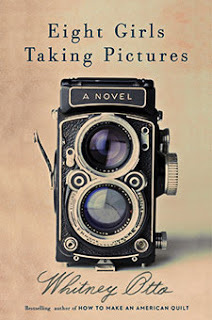
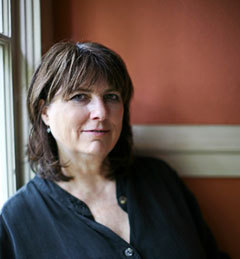
Who here didn't fall in love with How to Make an American Quilt? I still have my dog-eared copy on a shelf in my writing office. One of the most interesting writers around, Whitney Otto's new novel, Eight Girls Taking Pictures is a knockout. Whitney Otto is the author of five novels: How To Make an American Quilt, which was a New York Times Best Seller (as well as other bestseller lists) and NY Times Notable Book; nominated for the Los Angeles Times Art Seidenbaum Award, and adapted into a feature film produced by Steven Spielberg. Now You See Her was nominated for an Oregon Book Award, and optioned for film. The Passion Dream Bookwas a Los Angeles Times bestseller, optioned for a film, and an Oregonian Book Club selection. A Collection of Beauties at the Height of Their Popularity was a Multnomah County Library selection. Eight Girls Taking Pictures is being published by Scribner in November 2012. Her novels have been published in fourteen languages.Her work has also appeared in anthologies, magazines and the New York Times, The Los Angeles Times, The San Francisco Chronicle and The Oregonian. In 2006 she had an art exhibition of her shadow boxes at the Littman & White Galleries in Portland, Oregon. Thank you for being here, Whitney.
Your novel focuses on eight female photographers, six based on real-life shutterbugs, and two that you made up, each underscoring some issues of family, sexuality, politics and more. How did you come to choose the photographers and what went into your thought process in creating the made-up photographers?
I've loved the work of the chosen photographers since I was quite young, though I wasn't always familiar with their personal stories. The really short answer is that I wanted to spend time with them that went beyond admiring their pictures. Looking at their stories allowed me to travel time and countries while thinking about the complex lives of women (as you point out).
As for the two invented female photographers I will say that the work of the fictitious women are inspired by the real-life work of two real-life women photographers. I didn't base the last two chapters on known photographers because I didn't really know anything about their lives and because I needed lives that conformed to what I was trying to say in the novel.
In both cases--the known and the invented photographers--my primary interest was in those pictures that I loved. To say it in a very simple way, we look at a photo and recognize the image without ever really knowing the story. For example, Cunningham's "Unmade Bed, 1957," the first image in the novel, we see an unmade bed and some hair pins but we don't know anything else (what are the circumstances? What is the time of day? Is it night? Who's bed is it? How long have the sheets been tossed aside?). In my book, the photo depicts morning in a hotel in Berlin in 1910. So you have the exact same image, only with a different story. Though I should add that this book isn't simply an interpretation of a series of photographs.
I read that you originally decided to write this as nonfiction then segued into fiction. Why?
Though I did begin with a nonfiction version, I knew from the start that I would also write a novel using the same women. I very much liked the idea of the two books as companion pieces, so similar and so very different. Also, they would be written with completely different intentions. When I thought about returning to the (interrupted) nonfiction version, I realized that I really wanted to write the novel first. Who knows if I'll ever get back to the other.
How did fictionalizing the photographers free you?
The quick answer is that fiction allows for a certain amount of "creativity" with the biographical facts. As I said earlier, a life may not always conform to the story you want to tell (or the idea you are trying to express). Biographical fiction is a bit tricky because if you wander too far from the life of your subject, it really ceases to be your subject.
In the case of EIGHT GIRLS, I knew that I wasn't going to write complete, fictionalized biographies; I would work more in snippets and moments and images and invention with all of it inspired by their work and lives. They all have remarkable individual lives (which is why I added a bibliography of very good, extensive biographies as well as monographs of their work)--any one of them a fine novel in themselves--but I was attempting a novel that was more about ideas than biography. So fictionalizing, in this case, was necessary to put into play the ideas, as opposed to wanting to "rewrite' their lives, though in the process their lives were edited and rewritten while keeping their essential selves in tact. Or so I feel.
Since the book is so much about the creative life, I’d love to talk a little bit about yours.
I'm drawn to photography for many reasons, one of which is, for me, its similarity to writing: Photography, like writing, can be a service or an art or both. A writer and a photographer observe and record. Writing about photographers allows me to (sort of) write about the writing life.
What’s your daily writing life like?
I set a schedule that I can keep. It is usually based upon page numbers or chapters as opposed to increments of time, which doesn't work me. I wish I could have a time-based schedule because I think I would be more productive.
Do you have rituals?
Not really. Though I often have an object or two that sits on my desk that connects to the book. In the case of EIGHT GIRLS I had a couple of vintage postcards of the Tower Of Jewels (from the Pan-Pacific International Exposition in San Francisco in 1915), as well as one of the "jewels" (called Novagems) that had hung from the tower and were later sold as souvenirs, and a 1958 3.5E Rolleiflex camera that works beautifully.
I made box assemblages for many many years that I would work on during breaks in writing, though not during the writing of this book.
Do you outline or just have a vague idea of where you are headed?
No outline, but I may have a beginning and an end without knowing exactly how I'll connect the two. Or I have a a few images--I tend to think visually. The emotional part of the story is harder because I can sense what I want but am never sure if it will come through. Though I have ideas I try not to push them too hard. I'm also a "structuralist" -- I have to know the structure of the novel before I can begin, even if I may drop it later. I have to have something concrete; I can't just start writing.
Can you talk about the structure of this novel?
The structure is simple and pretty much dictated by the material, i.e. the "eight girls," whose stories--or I should say my specific interests with regard to their stories--spanned the 20th century. Once I realized that the arc of the novel would be the 20th century, everything fell rather effortlessly into place. Cymbeline Kelley (inspired by Imogen Cunningham) was a natural starting point, which made her the obvious character to link all the chapters. The length of Kelley/Cunningham's life (nearly 100 years) also worked in favor of the novel's timeline, themes and ideas. In many respects the various themes of the novel are present in that opening chapter. And I do feel that this book is a novel and not a story collection because of the overall sense at completion at the end; the strength of the chapters is evident when they are all taken together, not read individually.
How difficult was it to sustain it, or was it liberating?
I think having a defined structure is liberating. For me, it is what allows me to sustain writing something as large as a novel.
Were there any surprises in the writing?
There are always surprises in the writing, I mean, if you're lucky. You should know enough of your story to get started but not so much that you've worked out every detail. It's this odd space where you are telling yourself a story you think you know and then are happy to find you don't know it as well as you originally thought.
A lot of the novel is about how women manage or don’t manage to balance their lives with their work. Do you think it’s gotten any easier?
I don't think trying to manage all the aspects of a woman's life has gotten easier. We have more choices--even more than when I was kid--but one can't have everything. I know there is the joke that the woman who has everything is a man but I really think we understand that you can't be everywhere at once so we're now into negotiating what we can have; maybe choice has made us realists. Anyway, I think it was always about having options--not the having of everything--that defined progress for women.
How do you personally balance your life with your art?
You have a kind of general set of priorities, then you have the day-to-day situational priorities. If you don't live alone you have to be flexible. You have to understand that some days are going to be harder than others. That said, it can be difficult living with someone engaged in a creative endeavor because they (me) exhibit a necessary preoccupation until things (say, my novel) reaches a certain point. Maybe my family and friends should be answering this question...
What’s obsessing you now and why?
Aside from my usual obsessions? Nothing at the moment.
What question didn’t I ask that I should have?
You were too good--I can't think of anything else to say except Thank you!
Published on January 05, 2013 09:28
Meg Pokrass talks to poet T. R. Hummer about TV influences, music, poetry and so much more
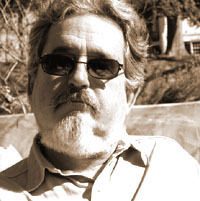
T. R. Hummer is the author of seven books of poetry, including, most recently, Useless Virtues (2001) and Walt Whitman in Hell (1996), both from Louisiana State University Press. "For Dancers Only: Suite for Jimmie Lunceford, 1902-1947" is from The Infinity Sessions, a work-in-progress. Hummer has edited The Kenyon Review and New England Review and is currently editor of The Georgia Review. He lives in Athens, Georgia. Thank you, Meg Pokrass for interviewing him!
What was it like growing up isolated in rural Mississippi rather (or totally) isolated as a kid, and what kind of reading did you do, growing up?
I was born in 1950 in a Mississippi still under the baneful spell of Jim Crow, a context so complex that it is difficult to describe succinctly. Furthermore, the situation there obviously was completely different for Caucasians than it was for African Americans (that difference, alas, was rather the point). My family were racist to the bone, as they were all caught in the same cultural web. The farm I was born on was still in some senses feudal, and its very existence depended on a serfdom of race. My situation therefore was also not quite like that of my contemporaries who lived in more urban places. On the one hand, it was Edenic: the farm (2400 acres divided up among various family members) was reasonably safe, and I was given free rein in it, so much of my early childhood was spent wandering unsupervised, Wordsworthian as a lonely wandering cloud. At the same time, with love in their hearts (and quite unconscious of what they were doing), my family were plucking out my eyes: for if the underclass in a racist culture is "invisible," the reason for that is the blindness of the "overclass," and just how does one get there except via the systematic blinding of the young?
Influences? TV and music…
For the generation of my father and mother, there were few opportunities for light to penetrate: they grew up deeply enmeshed in the local. My generation was luckier, and while I had no real human mentors in that distant universe, I did have several advantages: television, radio, and what in those days we quaintly called "the record player." Deep in the night, with a transistor radio plugged into one ear, I listened to music coming from afar: from New Orleans, Memphis, and Chicago. Almost all of this music was what used to be called "race music," and I was in awe of it. Meanwhile, nightly in the living room my father would tune the cubic black and white RCA tv to the news, and I would sit on the floor caught between the outrage of my father and the passionate reason of Martin Luther King: who do you think eventually won my loyalty?
What books did you pick up and what captured you then?
Books were always there, and I read omnivorously and indiscriminately, which is the best way to read. I read garbage and masterpieces without making much distinction between them: if the book took me somewhere (anywhere) other than where I was, I embraced it. The other media probed my immediate situation and put me slowly but surely at odds with pretty much everything in it; books were a portal out. I needed both.
I have an 11 year old daughter, so for the past 10 years 95% of the films I've watched are made for children. I'm grateful for that, for otherwise I would never have got so deep in the universe of Miyazaki, or appreciated the genius of somebody or other at Pixar. It's great to be an older parent of a younger child: I have also revisited tons of books that I would never have gone back to, and discovered a lot of new ones--for her and for myself.
Talk about your current work, what you are working on now. What is new? I have been for some years at work on what I had thought of as a trilogy of poetry books: Ephemeron, which came out in Nov. 2011, Skandalon, scheduled for Fall of 2014, and Eon, which is finished but my editor won't look at it yet: I'm being too prolific for the queue to deal with. I wanted it to go under the collective title Greek Fire. My press won't hear of it, aren't interested, would barely even talk about it. There is no profit in trilogies of books of poetry, they tell me: the end. So there will be no trilogy, just three books with similar titles and similar designs. Therefore, I will reserve the title Greek Fire for a new and selected, which in my mind will follow Eon
What obsesses you? I'm obsessed with the music of language, the language of music. There is a mystery in the connection between music and language that is so deep, and so thoroughly human, that we will never be done with it.
Published on January 05, 2013 09:21



